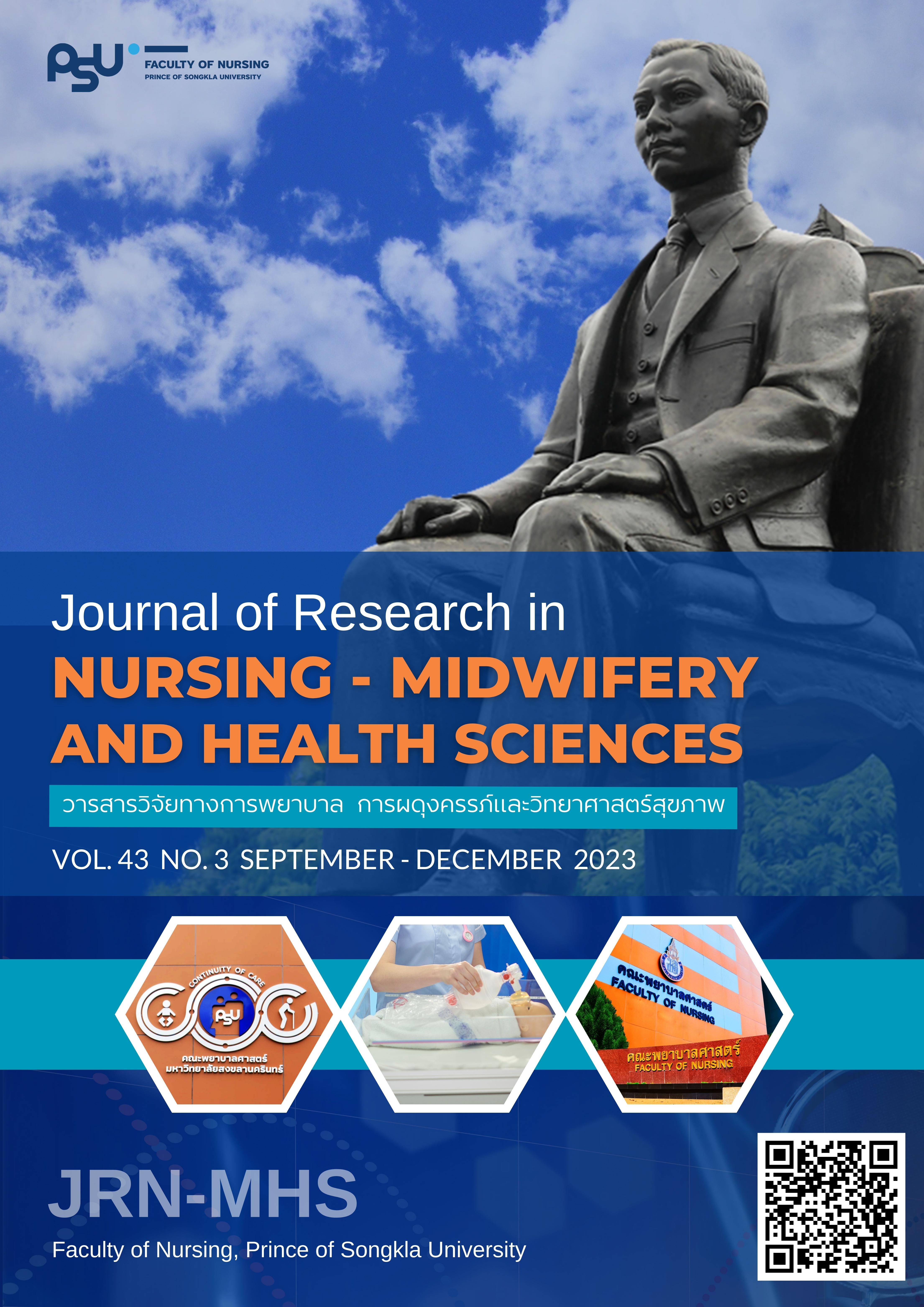ประสบการณ์ความเจ็บป่วยของผู้ป่วยภาวะหัวใจล้มเหลวระยะก้าวหน้าในยุควิถีใหม่
Main Article Content
บทคัดย่อ
วัตถุประสงค์: เพื่อบรรยายประสบการณ์ความเจ็บป่วยของผู้ป่วยภาวะหัวใจล้มเหลวระยะก้าวหน้าในยุควิถีใหม่ วิธีการ: ใช้ระเบียบวิธีวิจัยเชิงคุณภาพตามแนวคิดปรากฏการณ์วิทยาแบบบรรยาย ผู้ให้ข้อมูลเป็นผู้ป่วยภาวะหัวใจล้มเหลวที่เคยมีประสบการณ์การรักษาที่หออภิบาลผู้ป่วยโรคหัวใจของโรงพยาบาลมหาวิทยาลัยแห่งหนึ่งในภาคใต้ ที่อยู่ในเกณฑ์หัวใจล้มเหลวระยะก้าวหน้า ตั้งแต่ช่วงปี พ.ศ. 2563ถึง พ.ศ. 2565 เลือกแบบเฉพาะเจาะลง จำนวน 12 ราย เก็บรวบรวมข้อมูลในเดือนเมษายน ถึง เดือนสิงหาคม พ.ศ. 2565 โดยการสัมภาษณ์รายบุคคลแบบกึ่งโครงสร้าง พร้อมทั้งบันทึกเทปเสียงการสัมภาษณ์ วิเคราะห์ข้อมูลจากบทสัมภาษณ์ตามวิธีการของโคไลซี ผลการศึกษา: พบว่า ผู้ให้ข้อมูลรับรู้เกี่ยวกับประสบการณ์ความเจ็บป่วยในภาวะหัวใจล้มเหลวระยะก้าวหน้าในยุควิถีใหม่ เป็น 4 ลักษณะคือ 1) รักษาตัวอย่างโดดเดี่ยวขาดญาติมิตร 2) วางใจแพทย์ผู้ดูแลในการตัดสินใจการรักษา 3) ตระหนักว่าเป็นกลุ่มเสี่ยงจึงต้องปรับการดูแลตนเองใหม่ และ 4) ได้รับการติดตามอาการด้วยดิจิตอลแพลตฟอร์ม สรุป: ผู้ป่วยที่มีภาวะหัวใจล้มเหลวระยะก้าวหน้าในยุควิถีใหม่มีประสบการณ์ความเจ็บป่วยที่เกิดจากการถูกจำกัดการเยี่ยมไว้วางใจแพทย์ในการตัดสินใจการรักษา เนื่องจากขาดการวางแผนล่วงหน้าเกี่ยวกับภาวะสุขภาพรับรู้ถึงความเสี่ยงต่อการติดเชื้อ แต่รู้สึกพึงพอใจที่มีการติดตามการรักษาโดยใช้เทคโนโลยีในช่วงที่มีการระบาดของโควิด 19 ดังนั้นการพัฒนารูปแบบการวางแผนล่วงหน้าและระบบดิจิตอลแพลตฟอร์ม เพื่อติดตามอาการหรือการรักษาต่อเนื่องสำหรับผู้ป่วยภาวะหัวใจล้มเหลวระยะก้าวหน้าจึงเป็นสิ่งสำคัญและควรได้รับการพัฒนา
Article Details

อนุญาตภายใต้เงื่อนไข Creative Commons Attribution-NonCommercial-NoDerivatives 4.0 International License.
เอกสารอ้างอิง
Truby LK, Rogers JG. Advanced heart failure: epidemiology, diagnosis, and therapeutic approaches. JACC Heart Fail. 2020; 8(7): 523-36. doi: 10.1016/j.jchf.2020.01.014.
Atherton JJ, Sindone A, De Pasquale CG, et al. National Heart Foundation of Australia and Cardiac Society of Australia and New Zealand: Guidelines for the prevention, detection, and management of heart failure in Australia 2018. Heart Lung Circ. 2018; 27(10): 1123-208. doi: 10.1016/j.hlc.2018.06.1042.
Phrommintikul A, Buakhamsri A, Janwanishstaporn S, et al. Heart Failure Council of Thailand (HFCT) 2019 heart failure guideline: Acute heart failure. J Med Assoc Thai. 2019; 102(3): 373-9.
Cardiac Care Unit (CCU). Incident report of CCU 2020-2021, Songklanagarind Hospital, Thailand.
Mafham MM, Spata E, Goldacre R, et al. COVID-19 pandemic and admission rates for and management of acute coronary syndromes in England. Lancet. 2020; 396(10248): 381-9. doi: 10.1016/S0140-6736(20)31356-8.
Sankaranarayanan R, Hartshorne-Evans N, Redmond-Lyon S, et al. The impact of COVID-19 on the management of heart failure: A United Kingdom patient questionnaire study. ESC Heart Fail. 2021; 8(2): 1324-32. doi: 10.1002/ehf2.13209.
Chagué F, Boulin M, Eicher JC, et al. Impact of lockdown on patients with congestive heart failure during the coronavirus disease 2019 pandemic. ESC Heart Fail. 2020; 7(6): 4420-3. doi: 10.1002/ehf2.13016.
Radhakrishnan K, Allen C, DeMain AS, et al. Impact of COVID-19 on heart failure self-care: A qualitative study. J Cardiovasc Nurs. 2021; 36(6): 609-17. doi: 10.1097/JCN.0000000000000794.
Forsyth F, Sowden E, Hossain MZ, et al. Clinicians’ and patients’ experiences of managing heart failure during the COVID-19 pandemic: A qualitative study. BJGP Open. 2021; 5(6): 1-11. doi: 10.3399/BJGPO.2021.0115.
Trenta AM, Ausili D, Caruso R, et al. Living with heart failure during the COVID-19 pandemic: An interpretative phenomenological analysis. Clin Nurs Res. 2021; 30(7): 1071-8. doi: 10.1177/10547738211016614.
Preechakoon B, Molek R, Chuwongin D, et al. Nursing in data technology era. J Chulabhorn Royal Acad. 2020; 3(1): 19-39. Thai.
Colaizzi PF. Psychological research as a phenomenologist view it. In: Valle RS, King M, editors. Existential-phenomenological alternatives for psychology, New York: Oxford University Press; 1978.
Husserl E. Phenomenology and the crisis of philosophy: Philosophy as a rigorous science, and philosophy and the crisis of European man. New York: Harper & Row; 1965.
Jantawanitch S. Qualitative data analysis. 12 th ed. Bangkok: Chulalongkorn University Press; 2016. Thai.
Ainsworth BE, Haskell WL, Whitt MC, et al. Compendium of physical activities: An update of activity codes and MET intensities. Med Sci Sports Exerc. 2000; 32(9): S498-504. doi: 10.1097/00005768-200009001-00009.
Koch T. Implementation of a hermeneutic inquiry in nursing: Philosophy, rigour and representation. J Adv Nurs. 1996; 24(1): 174-84. doi: 10.1046/j.1365-2648.1996.17224.x.
Karlsson V, Bergbom I, Forsberg A. The lived experiences of adult intensive care patients who were conscious during mechanical ventilation: A phenomenological-hermeneutic study. Intensive Crit Care Nurs. 2012; 28(1): 6-15. doi: 10.1016/j.iccn.2011.11.002.
Rotondi AJ, Chelluri L, Sirio C, et al. Patients’ recollections of stressful experiences while receiving prolonged mechanical ventilation in an intensive care unit. Crit Care Med. 2002; 30(4): 746-52. doi: 10.1097/00003246-200204000-00004.
Creutzfeldt CJ, Schutz RE, Zahuranec DB, et al. Family presence for patients with severe acute brain injury and the influence of the COVID-19 pandemic. J Palliat Med. 2021; 24(5): 743-6. doi: 10.1089/jpm.2020.0520.
Sizoo EM, Monnier AA, Bloemen M, et al. Dilemmas with restrictive visiting policies in Dutch nursing homes during the COVID-19 pandemic: A qualitative analysis of an open-ended questionnaire with elderly care physicians. J Am Med Dir Assoc. 2020; 21(12): 1774-81.e2. doi: 0.1016/j.jamda.2020.10.024.
Thummakul D, Siriwattanakul T. Embrace: Love touch improved the elderly care. NJPH. 2017; 26(3): 1-12. Thai.
Ridd M, Shaw A, Lewis G, et al. The patient-doctor relationship: A synthesis of the qualitative literature on patients’ perspectives. Br J Gen Pract. 2009; 59(561): e116-33. doi: 10.3399/bjgp09X420248.
Chipidza FE, Wallwork RS, Stern TA. Impact of the doctor-patient relationship. Prim Care Companion CNS Disord. 2015; 17(5): 10.4088/PCC.15f01840. doi: 10.4088/PCC.15f01840.
Perepelkin J, Di Zhang D. Quality alone is not enough to be trustworthy: The mediating role of sincerity perception. IJPHM. 2014; 8(2): 226-42. doi: 10.1108/IJPHM-02-2013-0006.
Nishikawa Y, Hiroyama N, Fukahori H, et al. Advance care planning for adults with heart failure. Cochrane Database Syst Rev. 2020; 2(2): CD013022. doi: 10.1002/14651858.CD013022.pub2.
Fraser M, Mutschler M, Newman C, et al. Heart failure care delivery in the COVID-19 era: The patients’ perspective. Healthcare (Basel). 2021; 9(3): 245-50. doi: 10.3390/healthcare9030245.
Sokolski M, Kalużna-Oleksy M, Tycińska A, et al. Telemedicine in heart failure in the COVID-19 and post-pandemic era: What have we learned?. Biomedicines. 2023; 11(8): 2222-32. doi: 10.3390/biomedicines11082222.
Tersalvi G, Winterton D, Cioffi GM, et al. Telemedicine in heart failure during COVID-19: A step into the future. Front. Cardiovasc. Med. 2020; 7: 1-7. doi: 10.3389/fcvm.2020.612818.
Xu H, Granger BB, Drake CD, et al. Effectiveness of telemedicine visits in reducing 30-day readmissions among patients with heart failure during the COVID-19 pandemic. JAHA. 2022; 11: e023935-49. doi: 10.1161/JAHA.121.023935.
Nogueira MF, Ferreira F, Raposo AF, et al. Impact of telemedicine on the management of heart failure patients during coronavirus disease 2019 pandemic. ESC Heart Fail. 2021; 8(2): 1150-5. doi: 10.1002/ehf2.13157.
Severino P, Prosperi S, D’Amato A, et al. Telemedicine: An effective and low-cost lesson from the COVID-19 pandemic for the management of heart failure patients. Curr. Heart Fail. Rep. 2023; 20: 382-9. doi: 10.1007/s11897-023-00624-y.


